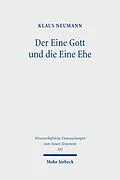The New Testament's prohibition of divorce reflects the symbolic role of marriage as representing God's covenant with His people. Klaus Neumann examines adultery and divorce in the Hebrew Bible, the Septuagint, and the New Testament, highlighting the linguistic challenges in translating adultery as unfaithfulness and its impact on views of marriage and fidelity.
The New Testament's prohibition of divorce forbids separating from a spouse or remarrying while the first partner is still alive. What accounts for this unique status of marriage compared to other human relationships? The indivisibility of marriage is rooted in its symbolic role as a representation of the covenantal "marriage" between God and his people. This connection is explored through the discourse on adultery and divorce in the Hebrew Bible, the Septuagint, and the New Testament. Additionally, the semantics of adultery are analyzed across the languages in which these discussions occur, highlighting their varying capacities to express a key concept: adultery as an act of "unfaithfulness" and a "breaking of one's own marriage" by the individual.
Autorentext
Geboren 1964; 1984-90 Studium der Ev. Theologie an den Universitäten Erlangen, Marburg, Bonn und München; 1999 Promotion; 2016 Pfarrer in Geslau; 2017 Habilitation; Privatdozent (Neues Testament) an der Augustana-Hochschule Neuendettelsau.
The New Testament's prohibition of divorce forbids separating from a spouse or remarrying while the first partner is still alive. What accounts for this unique status of marriage compared to other human relationships? The indivisibility of marriage is rooted in its symbolic role as a representation of the covenantal "marriage" between God and his people. This connection is explored through the discourse on adultery and divorce in the Hebrew Bible, the Septuagint, and the New Testament. Additionally, the semantics of adultery are analyzed across the languages in which these discussions occur, highlighting their varying capacities to express a key concept: adultery as an act of "unfaithfulness" and a "breaking of one's own marriage" by the individual.
Autorentext
Geboren 1964; 1984-90 Studium der Ev. Theologie an den Universitäten Erlangen, Marburg, Bonn und München; 1999 Promotion; 2016 Pfarrer in Geslau; 2017 Habilitation; Privatdozent (Neues Testament) an der Augustana-Hochschule Neuendettelsau.
Titel
Der Eine Gott und die Eine Ehe
Untertitel
Der biblische Diskurs über den Ehebruch und die Ehescheidung
Autor
EAN
9783161642890
Format
E-Book (pdf)
Hersteller
Genre
Veröffentlichung
28.06.2025
Digitaler Kopierschutz
Adobe-DRM
Dateigrösse
10.08 MB
Anzahl Seiten
813
Lesemotiv
Unerwartete Verzögerung
Ups, ein Fehler ist aufgetreten. Bitte versuchen Sie es später noch einmal.
